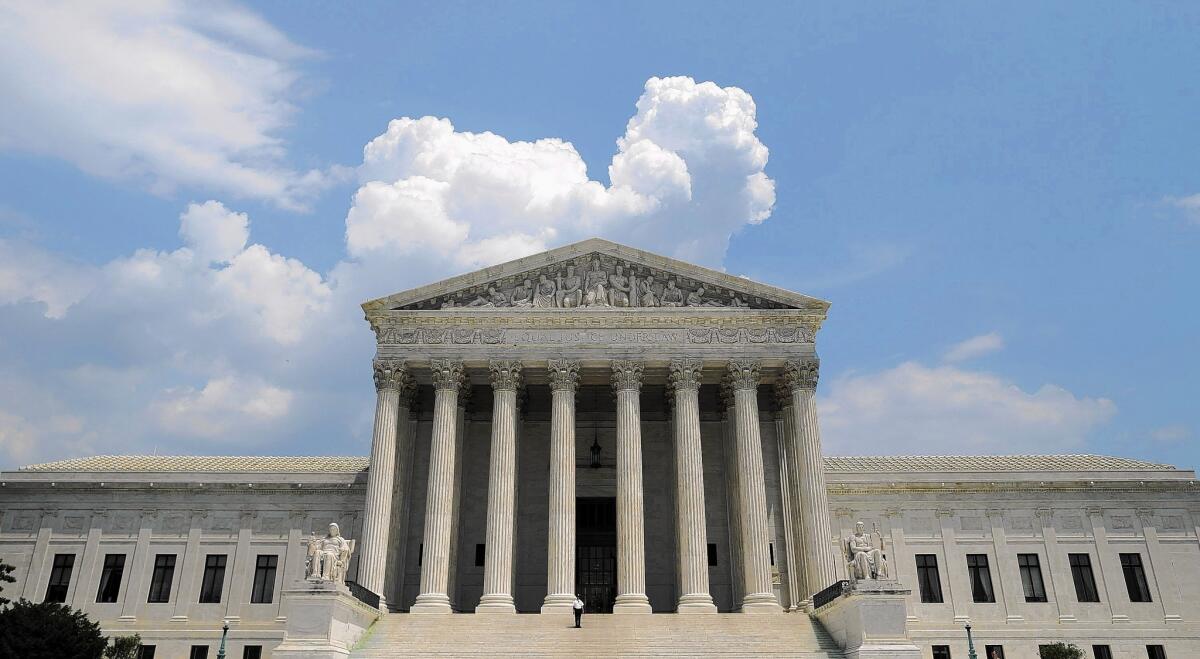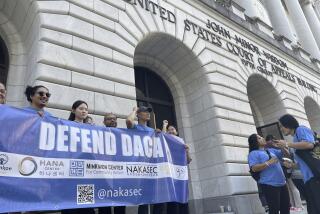Supreme Court to consider Trump effort to exclude from census any immigrants not legally in the U.S.

- Share via
WASHINGTON — The Supreme Court said Friday it would give President Trump another chance to exclude immigrants in the U.S. illegally from the 2020 census, in a case that targets the political power of California and other states with large immigrant populations.
The justices agreed to hear a special argument Nov. 30 to decide for a second time whether the census should consider residents’ citizenship or immigration status. By then, Amy Coney Barrett may have been seated as the new ninth justice.
The Constitution says the once-a-decade census should count the “whole number of persons in each state” and use that data to divide up seats in the House of Representatives and allocate federal funds to states and localities.
Throughout U.S. history, that language has been interpreted to mean that all residents are counted, regardless of whether they entered the country legally.
Last year the high court decided in a 5-4 vote to reject the Trump administration’s plan to include a citizenship question on the census.
But in late July, Trump announced that it would be the “policy of the United States to exclude from the apportionment base aliens who are not in a lawful immigration status ... to the maximum extent feasible.”
“My administration will not support giving congressional representation to aliens who enter or remain in the country unlawfully, because doing so would create perverse incentives and undermine our system of government,” Trump said in a written statement at the time.
Democrats denounced the move as an unprecedented effort to shift political power from areas with large immigrant populations to whiter, more rural states.
Demographers estimate that excluding immigrants here illegally from the count could cost California at least one congressional seat. Texas would also probably lose some representation, while states with few immigrants, including Alabama and Montana, would probably gain.
In addition to the redrawing of legislative boundaries every 10 years, census figures are also used to distribute billions of federal dollars among the states.
Democratic attorneys general in New York and several other states sued, arguing that Trump’s policy violated the law and the Constitution. A three-judge court in New York agreed, blocking Trump’s move.
But the high court’s justices said they would hear an appeal in Trump vs. New York, giving the administration an opportunity to revive the policy.
Dale Ho, director of the American Civil Liberty Union’s Voting Rights Project, said he expected the high court would again reject Trump’s argument.
“President Trump has repeatedly tried — and failed — to weaponize the census for his attacks on immigrant communities,” Ho said. “The Supreme Court rejected his attempt last year and should do so again. The legal mandate is clear: Every single person counts in the census, and every single person is represented in Congress.”
It is not clear as a practical matter how the census figures could be revised to exclude those who are in the country illegally, because the census itself does not ask about citizenship. The administration says it is exploring options such as using other government records to determine how many people to exclude.
It is also not clear what would happen if Trump is defeated for reelection. If Joe Biden wins the election, his administration would not be likely to adhere to Trump’s stated policy. Under the law, the president must present the state-by-state apportionment figures to the House, but Democrats who control the chamber might try to reject Trump’s count if they believe it is improper.
What is clear is that throughout Trump’s presidency, the White House has targeted undocumented immigrants in general and California in particular, and argued that the state’s political power in the House and in the electoral college is inflated because of a large population of residents who are here illegally.
Texas Republicans have also asked for census data that would allow them to exclude such residents when they redraw the electoral districts for the state Legislature. Doing so would shift political power away from areas such as Houston and the Rio Grande Valley and toward less Latino, more rural areas of the state.
Friday’s announcement was the court’s second this week on the census. On Tuesday, the justices granted an appeal from Trump’s lawyers and said the Commerce Department could halt its counting and field operations this week.
In response to the pandemic, the Census Bureau had said this year that it would continue counting until the end of October, but administration officials wanted a faster timetable to ensure the final results would be available for Trump to act on them before his current term ends in January.
More to Read
Get the L.A. Times Politics newsletter
Deeply reported insights into legislation, politics and policy from Sacramento, Washington and beyond. In your inbox three times per week.
You may occasionally receive promotional content from the Los Angeles Times.











